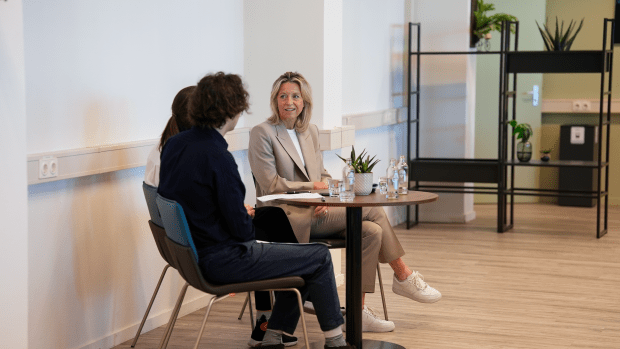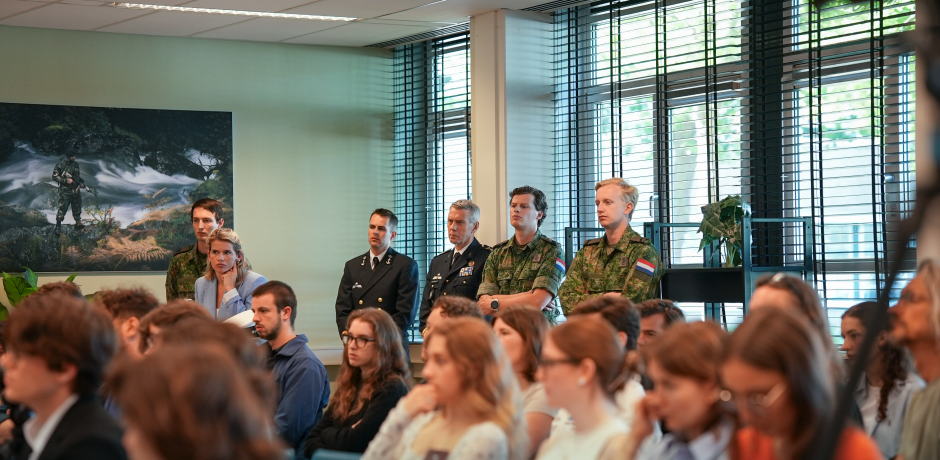
Long-awaited interview with Defense Minister Ollongren could continue, heavily secured
A high fence around the military Navy grounds, two controls, and a corridor secured by more than 15 soldiers. In a small room, about 30 students listened to a fraught conversation with outgoing Defense Minister Kasja Ollongren about NATO, Ukraine, and, of course, Gaza.
“You may not leave the room until the minister has safely left,” the officer on hand explained to those present Wednesday afternoon. The minister saw the heavy security as necessary because the interview with the minister already had to be canceled twice for security reasons. The ministry of Defence was especially concerned about disruption by pro-Palestine demonstrators, as had previously occurred at the interview with NATO boss Rob Bauer and at the interview with Mayor Halsema, which had to be moved as a precaution.
The somewhat grim situation remained an elephant in the heavily secured room, where the wars in Israel and Ukraine took center stage. First, however, Defense Minister Kasja Ollongren was allowed to say whether she was also pleased with the news from yesterday that outgoing Prime Minister Rutte will become NATO top man now that the only other candidate, Romanian Prime Minister Iohannis, is most likely to withdraw. “Oh, that news,” says Ollongren. “I especially think that whatever the background, as a former history student (like Ollongren and Rutte himself, ed.), Dutch or our prime minister, he should serve all countries equally well as NATO boss.
NATO
Ollongren sees a bright future for NATO, especially since it was revealed today that as many as 22 NATO countries, including the Netherlands, have long met the standard of spending two percent of GDP on defense costs. Although Russian President Putin believes the Western alliance is pursuing aggressive politics, Ollongren will hear none of that. “NATO is a defensive alliance. New allies, such as in Eastern Europe, are not forced to become members at all. It is Putin himself who wants to create a kind of new Soviet empire. It is he who is actually threatening our democracies.”
Therefore, the defense minister does not want to discuss a peace agreement between Ukraine and Russia. “You cannot talk about peace with a gun pointed at your head. The only time peace has been achieved like this in history was when a country had been completely conquered.”
So according to the Dutch minister, it will therefore be difficult to achieve peace with the Russians in the foreseeable future, whether with Putin or with a possible change in the Russian government as the Ukrainians are demanding. “I don’t think another regime would be better,” Ollongren explained. “At the end of the day, Russia is simply not a democratic country. Any regime would continue to focus on autocratic politics and war economy for a while.” But similarly to several Russia experts, the minister states, “This war economy of Russia will not last much longer.”
Israel
Ollongren argues that in the other major war, between Israel and Hamas, a cease-fire is absolutely necessary as soon as possible. “Things are beyond horrible in Gaza. It’s now a humanitarian disaster. Israel is not going to solve this with more military action. Save Palestine, save Israel. It can’t go on like this.”
Regarding halting collaboration with Israeli institutions as demanded by UvA demonstrators, such as with arms manufacturer Elbit Systems, she states, “We are using all our diplomatic means to get Israel to stop. The EU is now questioning the association treaty with Israel, and I am proud that this is a Dutch initiative.”
Anti-European government
Such diplomacy as well as defensive cooperation at the EU level is something Ollongren rates highly, even alongside the existence of NATO. “Even the United States - except perhaps Trump or anyone of his ilk - wants a stronger Europe. European military collaborations, for example with the British Marines and Belgian Navy, protect us better.”
Ollongren herself has only been a minister for about two weeks, but the D66 minister is not afraid of the new government's possible anti-Europe sentiment. “Our military is too dependent on Western alliances. Even if the government now thinks they can operate alone, they will find out soon enough that it is impossible.” The defense minister in our country must also rely primarily on the Commander of the Armed Forces.

Espionage
Although European powers, sometimes within the EU or NATO, can sometimes antagonize countries, Ollongren sees that even a Hungary of the more Russia-minded President Orbán can be persuaded with consultation to allow aid packages to Ukraine. “And if Article 5 - the principle that if one country is attacked, we all fight back - is triggered¸ then you need even less time for consultation. Even with Orbán.”
This joint defense is also needed, for example, in cybersecurity and espionage, the defense minister believes. Chinese spies, who are also allegedly influencing students, are already said to be in the Netherlands. and Russian secret agents, among others, have already been arrested in the United Kingdom and Germany. “We are focusing hard on our anti-spy network,” Ollongren said firmly. “We are also, for example, establishing systems in the North Sea, because we have Russian spy submarines popping up there.”
Conscription
Ollongren would also like to see more young personnel in the army, as would, for example, the ruling BBB party. However, the defence minister is not in favour of compulsory military service and the associated training and housing costs. “Since last year, following the Scandinavian example, we have the possibility of serving a year in the army. Then people can study or work afterwards. Often they then come back as reserve soldiers or with the internship programme Defensity College.”
Especially at this time, the minister thinks the willingness to serve in the military is high because, according to the former history student, with these wars we are living in “a decisive time in history, unprecedented since World War II.” Finally, Ollongren states that in Defence, she learned even better that we must cooperate with other countries as well as within our own country and, above all, listen to each other. Somewhat cynically, she concludes the conversation in the screened room with: “Open discussion, that is the strength of our democracy.”

